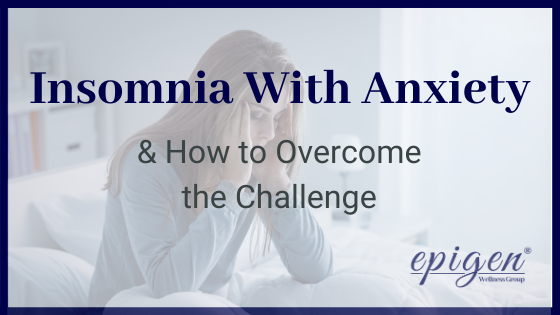Unfortunately, insomnia with anxiety is common. It can be a complicated challenge, too. That’s because it’s a chicken and egg situation where sometimes it’s difficult to know what came first and they both increase the severity and frequency of the other. It’s also possible to have a memorable event that makes it obvious to know when, where, how, and why the problem began. Sometimes the initial anxiety leads to insomnia and sometimes the initial insomnia leads to anxiety. There’s even a type of insomnia where the anxiety related to not being able to sleep well makes it harder to fall asleep and stay asleep – it’s called psychophysiological insomnia.
Regardless of what came first or the details of how it all came to be, this article will explain how to overcome the challenge.
Don’t worry – there will be a summary at the end in case you’re too sleepy, distracted, or anxious to take it all in now.
The truth is that both anxiety and insomnia make the other worse. Anxiety makes it harder to sleep. Lack of quality sleep aggravates anxiety. It becomes a downward spiral of anxiety and insomnia increasing together. To overcome the challenge, it’s important to address both at the same time and reverse the downward spiral. Yes, it really is possible to turn things around and improve both sleep and the mind/body stress response (anxiety) at the same time. To be clear, we can’t make all the stressful events and situations in life completely disappear, but we can control the way our minds and bodies react to stressful events and situations.
There’s so much information and advice available that claims to help overcome these two problems. Most of the tips address either insomnia or anxiety. This is an issue because most of it will not work for people who are experiencing both problems at the same time – insomnia with anxiety. The even bigger problem is that much of the advice can actually increase the problem!
Most sleep advice can make insomnia with anxiety worse!
First, let’s consider common insomnia advice. Most of the readily available advice is just a bunch of sleep tips or related to sleep hygiene. This consists of tips such as tracking sleep on a sleep log, sticking to a bedtime routine, going to bed at the same time every night, setting an alarm to up at the same time every morning, and dimming the lights before bed. While all these tips are accurate and great advice in theory, they are not appropriate for all situations. You guessed it – insomnia with anxiety is one of those cases where advice like this could make things worse.
One-size-fits all approaches generally do not work for insomnia with anxiety, or if it has been an issue for a while.
Let’s go back to that big term, psychophysiological insomnia.
Psychophysiological insomnia – a type of chronic insomnia, which may include difficulty falling asleep, staying asleep, returning to sleep, or getting quality sleep, that is related to negative associations or worries about sleep.
When the issue is insomnia with anxiety, it’s easy to slip into the pattern of worrying about sleep.
The sun is starting to go down. It’s getting later. I just know I won’t be able to fall asleep. I will be miserable lying in bed awake, struggling. I’ll be exhausted tomorrow. {Insert long list of horrible things that are sure to happen at bedtime and without adequate sleep.}
Sound familiar?
Now, consider all those sleep tips for a great night of sleep. They’re likely to cause more stress related to sleep. That alone can make them not work. When they don’t work, then there’s even more cause for negative thoughts related to sleep, making both insomnia and anxiety worse.
That doesn’t mean don’t try the sleep tips because they really can help. It just means not to take them too seriously, and not to rely on them as the only defense against insomnia, especially if there’s anxiety, too.
That brings us to the real question – what really does work to overcome the challenge of insomnia with anxiety?
It’s time to discuss how to overcome the challenge of insomnia with anxiety. This part is a little more complicated because everyone is different so the details will vary from person to person. However, there is one theme that remains constant: change the way the brain thinks about sleep, bedtime, and the bed. What does that mean?
First, let me ask you a few questions about insomnia with anxiety.
- Do you have anxiety, stress, or negative thoughts about going to bed, falling asleep, or staying asleep?
- Do you worry about insomnia, sleep, or being tired?
- Does not being able to fall asleep or stay asleep lead to fear?
- When you are in bed do you worry?
- When you are in bed do you have an active mind or a lot of thoughts?
If you answered ‘yes’ to any of the questions above, it’s time to change that.
I know what you’re thinking. Easier said than done, right? The good news is we have some tips for that, too.
There’s some great advice below, and we can send more information to your inbox. Click here and we’ll email you a free guide!
There are some things you can do to change the way the brain thinks about sleep, bedtime, and the bed. They’re also helpful for overcoming the challenge of anxiety.
5 Easy Steps to Start Improving Sleep While Calming the Mind and Body:
1. Reassure yourself that you can change and improve insomnia with anxiety.
The thoughts we think shape the beliefs we hold. The beliefs we hold impact the decisions we make and the actions we take. Thoughts, beliefs, and actions can improve or worsen insomnia and anxiety.
As humans, we have the power to control our thoughts, beliefs, and actions. It’s just a matter of learning how to control them. In terms of insomnia and anxiety, we can change thoughts, beliefs, and actions in ways that promote sleep and settle the mind and body. These steps are the first part of the process of changing thoughts, beliefs, and actions.
2. Notice when you start to have negative thoughts about sleep, bedtime, the bed, or any other negative thoughts.
Negative thoughts increase stress, anxiety, and fears, and make it difficult to sleep well. It’s really hard to change thoughts without noticing them first. Once those negative thoughts are brought to awareness it’s possible to change them, which shapes beliefs, impacts actions, and changes outcomes.
3. Find a way to shift those thoughts into something productive.
Negative thoughts are generally recognized as a problem first. When faced with a problem, the first step is to view it as a challenge to overcome instead of a problem with a dead end.
Example: shift from “I’m not going to sleep well tonight” to “I am determined to find something that works, even if it doesn’t happen tonight.”
That simple shift represents possibility, and with possibility comes the ability to change.
4. Set yourself up for success by doing something relaxing before bed – something that works for you.
This one gets more personal. What are some things that you like and help you to relax? What makes you happy and calm? How about a warm bath or cup of herbal tea? Do you find peace in curling up under a blanket with a book? Does journaling help you to clear your active mind? Does walking help you to settle your nerves?
These are just some ideas to get you started. Find some things that help you to relax and work them into an evening routine. After finishing your relaxing activities, and doing all the little things like brushing teeth and putting on pajamas, try one more thing.
Close your eyes, inhale and exhale deep, calming breaths, and focus on calming your mind and body. Clear all your thoughts from the day. Relax all your muscles. If you find this practice difficult, stressful, or overwhelming, it may be time for the next step, step #5.
5. Seek help when needed. Support is available, and it works. CBT-i is the treatment of choice for insomnia.
It takes strength and bravery to recognize when help is needed and to follow through with accepting support. If you have made it this far in reading, you have all the strength and bravery needed. Sometimes a little outside help is needed to turn the corner to great sleep and a calm mind and body, especially when it has been a struggle for a long time or is a moderate to severe issue.
For reference, chronic insomnia is difficulty sleeping two or more nights per week for six weeks or more. Taking longer than 15 minutes to fall asleep, awakening more than once per night, not being able to return to sleep in under a minute, OR not getting quality sleep are all signs of insomnia and stress.
The American Academy of Sleep Medicine, along with sleep specialists, recommend CBT-i techniques for the treatment of insomnia. This recommendation is backed by scientific research and numerous studies to be the most effective treatment for insomnia.
Bonus: there are no negative side effects and there are benefits beyond sleep!
CBT-i works best in a structured, one-on-one program with a trained professional who can customize the techniques based on individual needs.
Do you need more support?
Our RESTED program for insomnia includes CBT-i techniques, along with other highly effective techniques. Many people who go through our RESTED insomnia program also have anxiety and find that their anxiety improves along with their sleep. One of the reasons the program is so effective is because it is customized to fit individual needs – instead of providing a bunch of generic sleep tips that can make the problem worse.
We would love to help you overcome the challenge of insomnia with anxiety so you can thrive and enjoy life as you deserve to do.
Our RESTED program was created for that challenging combination of insomnia and a stressed, worrying, active mind. Click here to learn more!
Summary:
- Insomnia and anxiety both make the other worse. It can become a downward spiral, but that spiral CAN be reversed and both can improve together!
- Many tips and recommendations don’t work and can make things worse. They may be good, accurate suggestions, but they work best for people with minor and short-term struggles with stress and sleep.
- For a solution to be effective, the stress response of the mind and body (anxiety) needs to be considered along with sleep.
- Start by noticing thought patterns, shifting thought patterns, preparing for sleep, and seeking support if going at it alone doesn’t help enough.
- Support is available, and it really works! We’ve got your back. Click here for a free guide delivered to your email inbox.
This blog post discussed a challenge (insomnia with anxiety) and how to overcome that challenge. Here are more blog posts related to the word ‘challenge’ (not sleep and anxiety) from other sites:
The Motherhood Penalty Challenge By Ashley Olivine
Challenging Times & 3 Ways to Endure the Struggle By Lindsey Gibson
Jar Full of Manna 31 Day Discipleship Challenge By Kelly Heath


Trackbacks/Pingbacks